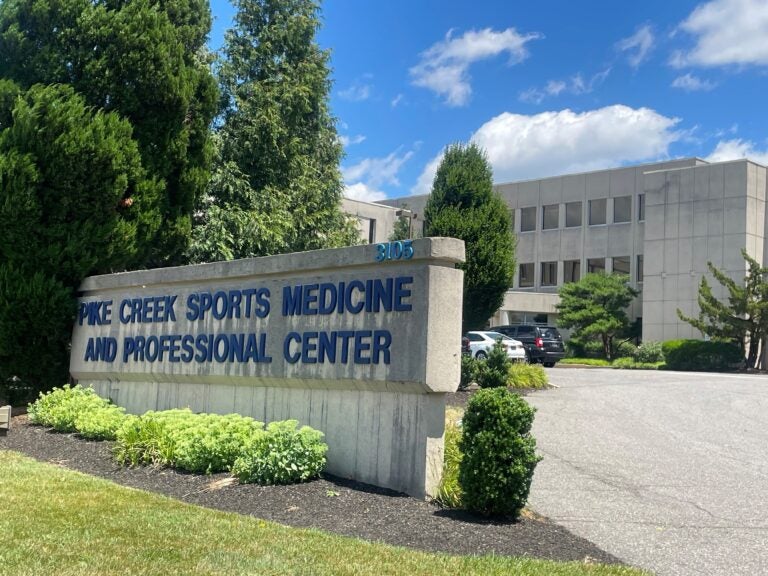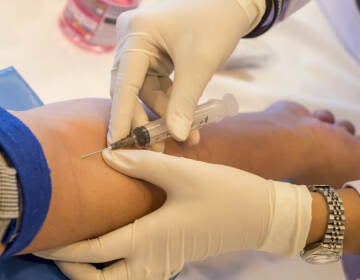Feds say pain treatment practice bilked Medicare, Medicaid of millions of dollars with unnecessary tests
The medical group’s lawyer disputes the allegations that the practice acted with “disregard or deliberate ignorance” of reimbursement rules.
Listen 1:51
The Center for Interventional Pain & Spine LLC has 11 offices in the region, including one in this office building in Delaware's Pike Creek area. (Cris Barrish/WHYY)
From Philly and the Pa. suburbs to South Jersey and Delaware, what would you like WHYY News to cover? Let us know!
Every patient at the pain clinic had to submit urine samples for drug testing every three months, regardless of whether the evaluation was medically necessary.
Thousands of patients also filled out psychological and neurological questionnaires, but doctors didn’t use the results to guide treatment, even when medical intervention was warranted.
Those alleged actions comprise the heart of the Center for Interventional Pain and Spine, LLC’s “scheme to illegally profit” from the Medicare and Medicaid insurance programs, the U.S. Attorney’s Office in Delaware has charged in a new lawsuit. They also accuse the center of billing the government for tests that were not done.
The medical group that the lawsuit also refers to as CIPS has 11 offices in Delaware, Maryland and southeastern Pennsylvania, including one in Bryn Mawr.
Federal prosecutors claim that CIPS and its then-president, Dr. Chee H. Woo, were paid millions of dollars from 2018 and 2021 through thousands of civil — not criminal — violations of the federal False Claims Act.
The lawsuit charges that Dr. Woo, who lives in Wayne, Pa., and is licensed to practice in Delaware, “developed and implemented” the scheme to unjustly enrich his company. Prosecutors said CIPS even increased its ill-gotten profits by buying expensive equipment to evaluate the drug tests in-house rather than send them out for analysis.
The center’s website currently lists Woo as “chief clinical director’’ and says he “understands that every patient’s pain is different and patients can have very different responses to the same treatment method. Therefore Dr. Woo is committed to offering the right treatment for the right patient.”
Woo did not respond to a request for comment by WHYY News, but Michigan attorney Ronald W. Chapman II, who represents the doctor and the company, said they will contest the lawsuit and would soon be filing a dismissal motion.

“This case has been investigated for a long period of time and relates to a difference of opinion between the practice and the government on how urine drug tests should be billed for and reimbursed,’’ Chapman said in a phone interview.
“Our position and the position of the American Society of Interventional Pain Physicians is that you should determine what risk a patient might have, and then urine drug test them appropriately according to that risk, and that’s exactly what the practice did. Unfortunately, Medicare and other insurance guidance in this arena has shifted heavily over time and it’s been incredibly vague.
“This practice provides pain management to a large amount of the population in Delaware and other states because of its size, and they’re a vital service for folks in debilitating pain.”
David Weiss, U.S. Attorney for Delaware, said the lawsuit stemmed from a proactive analysis of Medicare claims data.

“Billing federal health care programs for services that are not medically necessary and that are not actually provided undermines the quality of patient care and increases the costs of these taxpayer-funded programs,’’ Weiss said. “We are committed to holding accountable those medical providers who seek to exploit these programs for their own benefit.”
The lawsuit seeks an order to have CIPS repay the government plus interest and penalties, as well as the cost of investigating and prosecuting the case, though no amount was specified.
Suit says pain center had ‘disregard or deliberate ignorance’ of rules
Assistant U.S. Attorneys Shamoor Anis and Jacob Laksin claim in the lawsuit that Woo and the center acted “with disregard or deliberate ignorance of whether they were false” when filing bogus claims for reimbursement.
The prosecutors wrote that the clinic and Woo ignored notices from its laboratory consultant that technicians were ordering the drug tests that under federal regulations must be ordered by physicians. “It is up to the physicians to risk assess every patient, at every appointment,” the consultant reminded the center, to no avail, according to the lawsuit.
Instead, Woo and other physicians “routinely failed to perform any risk assessment prior to ordering” the drug screens, “and some had no knowledge” that urine samples were being taken.
In addition, doctors’ notes in patients’ medical records often didn’t contain any “documentation of medical necessity” for the testing, the lawsuit said.
Many patients also were deemed at “high risk’’ of abusing narcotics and anti-anxiety drugs when “such a classification obviously lacked any medical basis,” the lawsuit said.
On several occasions, new patients were tested for drugs the doctor prescribed that day, the lawsuit said. And even though they had not picked up or taken the medication yet, the result of the drug screen was classified as “inconsistent” because a drug that allegedly “should have” been in their bloodstream was not. That led to patients being labeled “high risk” for years without any further assessment by the doctor.
Instead, the center had the urine tests taken on a routine basis even though they were not ordered by treating physicians, patients didn’t receive an “individualized” risk assessment, records did not document the necessity for testing, and results were not used for diagnosis or treatment, the lawsuit said.
The prosecutors pointed out in the filing that under the rules for Medicare, the federal health insurance program for senior citizens, so-called “blanket orders” — defined as “an identical order for all patients in a clinician’s practice without individualized decision-making at every visit” — are “noncovered services” for which Medicare may not be billed.
Health care providers who submit claims to Medicare must certify “the services on this form were medically necessary and personally furnished by me or were furnished incident to my professional service by my employee under my direct supervision,” the lawsuit said.
Delaware’s Medicaid program for low-income and disabled individuals has similar certification requirements that guide its reimbursements to providers.
CDC urges doctors to consider ‘benefits and risks’ of drug testing
Getting urine samples to test for drugs, as the lawsuit points out, is often used to manage patients being treated with oxycodone or other opioids, in large part to guard against an overdose.
The purpose is to “monitor whether patients are taking prescribed drugs and adhering to treatment,” the lawsuit said. “The tests are used both to confirm that patients are taking, rather than diverting, the drugs that are prescribed to them, and that they are not taking other drugs not prescribed by the treating physician.”
Kate Nicholson, executive director and founder of the Denver-based nonprofit National Pain Advocacy Center, noted that since the 1990s, drug testing has been used extensively by many doctors.

Since 2022, however, guidelines issued by the U.S. Centers for Disease Control and Prevention call for doctors who prescribe opioids to “consider the benefits and risks of toxicology testing.”
Those considerations include not to use testing as a punitive measure and being wary of biases and the possibility of false positives.
“Clinicians should consider toxicology test results as potentially useful data, in the context of other clinical information, for all patients and consider toxicology testing whenever its potential problems can be mitigated,” according to the guidelines, which also said testing should not be used as a reason to dismiss patients from care.
Nicholson said she was part of a CDC working group that reviewed and provided comments on what she says are sensible guidelines on drug testing.
“They recommend that it can be done in the context of what’s needed for patient care and done very carefully,” she said. “They should be used with a lot of attention and care and in a person-centered, non-routine way.”
“The focus on all of these things is really looking at the needs of the patient in front of you, not necessarily treating everyone in a one-size-fits-all manner.”
Nicholson, who is also a lawyer, would not comment on the merits of the lawsuit, but said that “ordering drugs or psychological screening where no treatment happens is inherently problematic.”
Defense attorney Chapman did not address the specifics of the government’s allegations but noted that under the CDC regulations in place from 2016 to 2022, the period covered in the lawsuit, patients receiving high dosages of narcotics should be considered high-risk and monitored closely.
“The government doesn’t seem to acknowledge the fact that many of these patients were receiving the type of dose that the CDC would have suggested required closer monitoring, and instead believes that patients in some cases shouldn’t be monitored,” Chapman said.
No follow-up on patient’s report of daily depression, anxiety
The second component of the alleged scheme was that thousands of physiological and neurological tests were submitted for payment when they were either not performed or were not necessary and not used to guide treatment even when warranted.
To qualify for reimbursement, such tests must be ordered by the treating physician to assess a patient’s “cognitive, emotional, and behavioral functioning” and help those “with known or suspected mental disorders or dysfunction,” the lawsuit said.
But testing conducted “when no mental illness/disability is suspected is considered screening and is not covered by Medicare,” the lawsuit said.
Instead, during a two-year period the pain center sent Medicare, Medicaid and a health program for civil service federal employees a bill for psychological testing “for nearly every patient visit,” the lawsuit said.
The testing consisted of screening questionnaires that were not used to “diagnose mental illness or brain dysfunction” or to help guide treatment.
The lawsuit used the example of a patient identified only as C.W.
The center billed Medicare 46 times for psychological screening for nearly every appointment C.W. had over a three-and-a-half-year period — sometimes twice in the same month.
Several times the patient “reported feeling depressed or anxious on a daily basis, but the results “were never addressed or reported in C.W.’s progress note” for that office visit.

Get daily updates from WHYY News!
WHYY is your source for fact-based, in-depth journalism and information. As a nonprofit organization, we rely on financial support from readers like you. Please give today.







